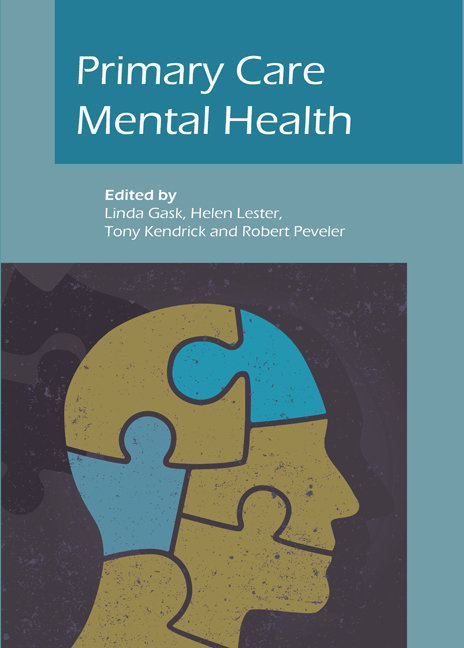Book contents
- Frontmatter
- Contents
- List of figures, tables and boxes
- List of contributors
- Preface
- Part I Conceptual basis and overarching themes
- Part II Clinical issues
- 8 Depression
- 9 Suicide and self-harm
- 10 Anxiety
- 11 Medically unexplained symptoms
- 12 Mental health problems in older people
- 13 Perinatal mental health
- 14 Child and adolescent mental health
- 15 Psychosis
- 16 Emergencies in primary care
- 17 Substance misuse
- 18 Management of alcohol problems
- 19 Eating disorders
- 20 Physical health of people with mental illness
- 21 Ethnic minorities
- 22 Asylum seekers and refugees
- 23 Sexual problems
- Part III Policy and practice
- Part IV Reflective practice
- Epilogue
16 - Emergencies in primary care
from Part II - Clinical issues
- Frontmatter
- Contents
- List of figures, tables and boxes
- List of contributors
- Preface
- Part I Conceptual basis and overarching themes
- Part II Clinical issues
- 8 Depression
- 9 Suicide and self-harm
- 10 Anxiety
- 11 Medically unexplained symptoms
- 12 Mental health problems in older people
- 13 Perinatal mental health
- 14 Child and adolescent mental health
- 15 Psychosis
- 16 Emergencies in primary care
- 17 Substance misuse
- 18 Management of alcohol problems
- 19 Eating disorders
- 20 Physical health of people with mental illness
- 21 Ethnic minorities
- 22 Asylum seekers and refugees
- 23 Sexual problems
- Part III Policy and practice
- Part IV Reflective practice
- Epilogue
Summary
Acutely disturbed behaviour
General practitioners (GPs) are not regularly called to attend people with acutely disturbed behaviour, but when they do it is often as an emergency, and assessment may be quite challenging. It is usually necessary to see the person at home, in a public place, or a police station, and family, friends, or the police are expecting urgent action to help defuse a tense situation, as well as advice and help for the person in acute distress.
First and foremost, it is crucial to determine whether an episode of acute disturbance in a person's behaviour is due to physical illness (especially in elderly patients), the effects of drugs (whether prescribed or recreational), or an acute mental health problem, because the management of these different types of problem is quite different.
It is important therefore to obtain a history wherever possible from a family member or other carer who can describe the person's behaviour before the acute disturbance and any drugs they may have taken, as this is key to making a correct diagnosis.
Acute confusional state (or delirium) This usually occurs in elderly patients, and more often among those with pre-existing dementia. The onset is quick, over a few hours, and typically there is fluctuation in the level of consciousness, with periods of drowsiness between bouts of disturbed behaviour or mood swings, which distinguishes acute confusion from psychiatric disorders. Patients may have visual and tactile hallucinations and disorientation in time and place, and sometimes an altered level of consciousness. They may also present as being either overaroused (e.g. restlessness, overactivity, psychotic symptoms), or underaroused (e.g. slowness, reduced speech, inactivity).
As well as chest or urinary infections, less common causes include drug side-effects (opiate analgesics, sedatives, anti-Parkinson drugs, hypoglycaemics, etc.), renal failure, heart failure, liver failure and subdural haematoma (Box 16.1). Immediate investigations for physical problems should be instigated (blood count, electrolytes, chest X-ray, urine testing, etc.) and the cause treated as appropriate. Often patients with acute confusion need to be admitted to hospital if they cannot be nursed at home satisfactorily by family or home nursing teams. If admission is necessary, this should be under the care of the medical team rather than to a psychiatric ward.
- Type
- Chapter
- Information
- Primary Care Mental Health , pp. 246 - 256Publisher: Royal College of PsychiatristsFirst published in: 2017



